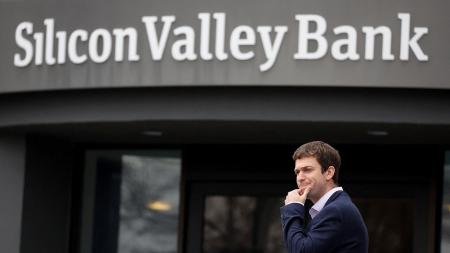The CEO of Silicon Valley Bank (SVB), Greg Becker, sold US$ 3.6 million in shares of the bank two weeks before the collapse of the entity that was closed on Friday by the United States Government to protect the deposits of its clients. and that it will be reopened on Monday under federal control.
Becker sold 12,451 shares on February 27, the first time he had done so in more than a year, according to forms delivered to the regulatory authorities that were disseminated by the Bloomberg news agency.
The plan to sell the shares had been delivered just over a month earlier, on January 26.
Both Becker and SVB have not yet responded to press inquiries regarding this sale of shares and whether or not the operation simply responded to a temporary coincidence.
The entity, founded 40 years ago, is recognized for financing emerging technology companies (startups) in Silicon Valley
Becker’s moves put another element under scrutiny at SVB, a bank that was closed on Friday by the US government to protect its clients’ deposits and will reopen on Monday under federal control.
The entity, founded 40 years ago and recognized for financing Silicon Valley technology startups to which large banks are usually reluctant to lend money, began to suffer a run last Thursday, after eating a letter from Becker to the shareholders of SVB in which he indicated that the bank had losses of US$1.8 billion in the first quarter and that, faced with this, it was planning an accelerated placement of shares of US$1.75 billion to clean up its capital position.

SVB was particularly affected by the sudden change in US monetary conditions: in 2021, companies supported by venture capital firms managed to finance themselves for a record of US$ 330,000 million, in a context of ultra-low rates by the FED.
The bank took billions of dollars in deposits and, confident that rates would not change, put the money into long-term Treasury bonds.
The bank took billions of dollars in deposits and, confident that rates would not change, put the money into long-term Treasury bonds.
However, with record inflation in 40 years, the Fed ordered one of the fastest monetary adjustments in its history, and the bonds lost much of their value.
Another effect of the rate hike was the impact on the technology sector, since these companies – especially in their early stages of development – are the ones that most need cheap financing to solve growth that is not profitable in its early years. Without financing, they need to withdraw their savings from banks.
In a domino effect, the rate hike caused SVB’s deposits to fall and the bank had to sell its devalued bonds at a loss.
The withdrawal was prompted by the venture capital firms themselves, which advised startups to withdraw funds from the bank due to the risk of insolvency.
After Becker’s letter became known, a bank run began in which investors and savers tried to extract US$ 42,000 million in less than 24 hours.
The withdrawal was prompted by the venture capital firms themselves, which advised startups to withdraw funds from the bank at risk of insolvency, despite Becker’s appeals to the bank’s large clients for calm.
At the time of its closure by the federal authorities on Friday, the bank had a negative balance of US$958 million.
According to the California Department of Financial Protection and Innovation (DFPI) – the authority that ordered its closure – the run “caused the bank to be unable to pay its obligations.”
The fall of SVB is the biggest failure in the US financial system since the Lehman Brothers crisis of 2008
SVB’s fall is the biggest failure in the US financial system since the 2008 Lehman Brothers crisis, as it is the 16th largest bank in the country, with $209 billion in total assets at the end of 2022.
Now the market fears a contagion effect in other banking entities: in particular, the sights are set on the medium and small banks that were left out of the FED’s radar and that took riskier positions with respect to the big players.
In 2018, the Trump administration reversed some of the heavy regulations imposed by the 2008 crisis on these small banks, raising the requirement to qualify as a “systematically important” bank from $50 billion to $250 billion. which, for example, requires annual financial stress tests.
While, Among SVB’s client startups there is concern about not being able to pay their salaries from next week.
It is that the Federal Deposit Insurance Corporation (FDIC), the federal authority that will be the depository of the bank’s funds, promised access on Monday to insured deposits, but this protection only covers those that are less than US$ 250,000, a minority percentage among bank customers.


















